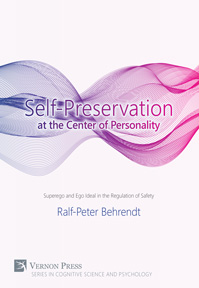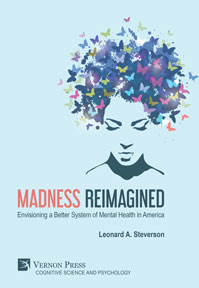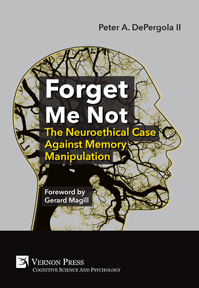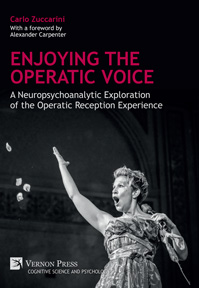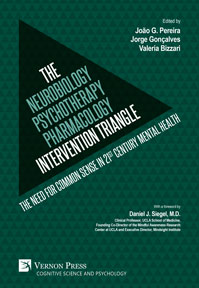Cognitive Science: Recent Advances and Recurring Problems
Joao Eduardo Kogler Jr., Frederick Adams, Osvaldo Pessoa Jr. (Eds.)
by Joao Eduardo Kogler Jr. (University of Sao Paulo, Brazil), Frederick Adams (University of Delaware), Osvaldo Pessoa Jr. (University of Sao Paulo, Brazil)
Purchase this book
(click here to change currency)
"The volume is a wide-ranging sampler of topics in cognitive science, broadly constructed. The papers include multiple historical, philosophical, and scientific perspectives. There is good coverage of topics that will be familiar to the majority of cognitive scientists, such as embodied cognition, autonomous action, the role of brain connectivity in understanding cognition, and computational modeling. There are also some nice papers that broach topics a bit more off the beaten path, such as the non-image forming visual system, the history of neuroscience, and cognition in Peirce’s semiotic. In short, there seems to be something in this collection for everyone."
Prof. Kenneth Aizawa,
Rutgers–Newark Colleges of Arts & Sciences, The State University of New Jersey
This book consists of an edited collection of original essays of the highest academic quality by seasoned experts in their fields of cognitive science. The essays are interdisciplinary, drawing from many of the fields known collectively as “the cognitive sciences.” Topics discussed represent a significant cross-section of the most current and interesting issues in cognitive science. Specific topics include matters regarding machine learning and cognitive architecture, the nature of cognitive content, the relationship of information to cognition, the role of language and communication in cognition, the nature of embodied cognition, selective topics in visual cognition, brain connectivity, computation and simulation, social and technological issues within the cognitive sciences, and significant issues in the history of neuroscience. This book will be of interest to both professional researchers and newer students and graduate students in the fields of cognitive science—including computer science, linguistics, philosophy, psychology and neuroscience. The essays are in English and are designed to be as free as possible of technical jargon and therefore accessible to young scholars and to scholars who are new to the cognitive neurosciences. In addition to several entries by single authors, the book contains several interesting roundtables where researchers contribute answers to a central question presented to those in the focus group on one of the core areas listed above. This exciting approach provides a variety of perspectives from across disciplines on topics of current concern in the cognitive sciences.
Introduction
Acknowledgements
Part I: Invited Talks
Chapter 1: Autonomous action in complex mechanical systems: a real dilemma?
Maria Eunice Q. Gonzalez
Chapter 2: A slim defense of narrow content
Frederick Adams
Chapter 3: Thinking with friends: embodied cognition and relational attention in friendship
Claus Emmeche
Chapter 4: Neutral monism’s scientism and its pragmatic limits
Sofia Inês Albornoz Stein
Chapter 5: The non-image-forming visual system: its relation to sleep, circadian rhythm, pupillary light reflex and other functions
Dora Fix Ventura, Ana Laura de Araújo Moura, Gloria Liliana Duque-Chica, Balázs Vince Nagy, Carolina P.B. Gracitelli, Ana Luiza V. Milioni, Kallene Vidal Summer, Augusto Paranhos Jr., Mirella Telles Salgueiro Barboni
Chapter 6: Can brain connectivity analysis help understand brain functions?
Koichi Sameshima, Luiz A. Baccalá
Chapter 7: A neural link centered approach to brain connectivity
Luiz A. Baccalá, Koichi Sameshima
Chapter 8: Simulation and adaptivity
João José Neto
Part II: Contributed Essays
Chapter 9: Technology and society: the impacts of the internet of things on individuals’ daily life
Mariana Claudia Broens, João Antonio de Moraes, Arturo Forner-Cordero
Chapter 10: The revisionist strategy in cognitive science
Samuel C. Bellini-Leite
Chapter 11: Information, context and structure in cognition
Joao Eduardo Kogler Junior, Paulo Eduardo Santos
Chapter 12: How complex behavior emerges from spikes
João Ranhel, Emilio Del Moral Hernandez, Marcio Lobo Netto
Part III: Topical Questions
Chapter 13: Language, communication, and cognition
André Leclerc, William A. Pickering
Chapter 14: Cognition in Peirce’s semiotic
Ivo Assad Ibri, João M. Queiroz, Vinicius Romanini
Chapter 15: A dialogue concerning the mind-body problem
Alfredo Pereira Jr., Jonas Gonçalves Coelho, Osvaldo Pessoa Jr.
Chapter 16: Machine learning and the probabilistic modeling of cognition and behavior
Peter Maurice Erna Claessens, João Ricardo Sato
Chapter 17: Computational models for simulating cognition and behavior: reflections on their methods, scope, and underlying epistemology
Diego Zilio, Flávio Soares Corrêa da Silva, Luciano Silva
Chapter 18: Advances and perspectives in cognitive architectures
Angelo Loula, Marcio Lobo Netto, Mauro Muñoz, Ricardo Gudwin
Chapter 19: What is the relation between spike-timing-dependent plasticity and memory?
Fabio M. Simões-de-Souza, Gabriela Antunes
Chapter 20: History of neuroscience and current philosophical problems
Francisco Rômulo Monte Ferreira, Maria Inês Nogueira
Index
Fred Adams is Professor of Cognitive Science and Philosophy at the University of Delaware. His interests include research on knowledge, language, intentional action, memory, and ethics. He authored the book The Bounds of Cognition in 2008.
Osvaldo Pessoa Jr. is a philosopher of science at the University of Sao Paulo. His research interests include philosophy of physics, computational modeling of the history of science, and philosophy of mind.
Joao E. Kogler Jr. is Physicist and Electrical Engineer at the University of Sao Paulo. He worked many years with computational intelligence, computer vision, image processing and mathematical modeling of visual perception, and currently his fields of research include cognitive science, cognitive robotics and cognitive architectures.
Adaptivity, autonomy, brain connectivity, cognitive architectures, cognitive simulation, complexity,
computational intelligence, consequence operators, emotion, friendship, information and communications
technology, machine ethics, machine learning, neuroscience of artistic creation, neutral monism, non-image
forming visual system, physicalism, probabilistic models, self-organization, semiotics.
See also
Bibliographic Information
Book Title
Cognitive Science: Recent Advances and Recurring Problems
ISBN
978-1-62273-100-8
Edition
1st
Number of pages
324
Physical size
236mm x 160mm

![Cognitive Science: Recent Advances and Recurring Problems [Hardback]](/file/3908/893934e240484a4043552f418fca7c33/1495708663.jpg)


